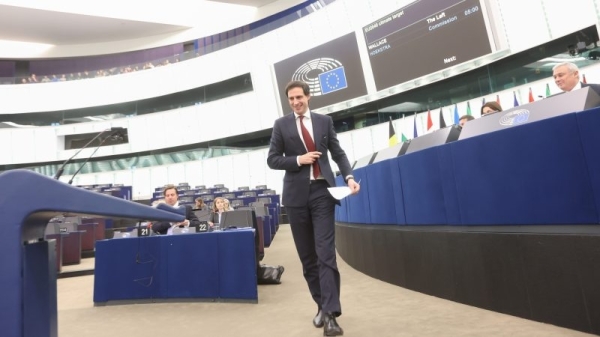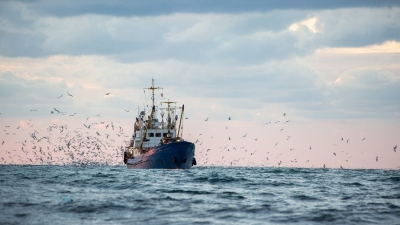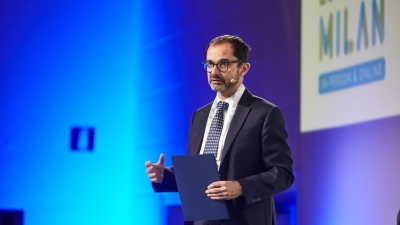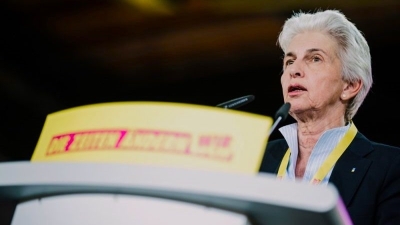EU Parliament groups clash on 2040 climate goal, in post-election preview

Political groups in the European Parliament have offered radically opposing views on the EU’s recommended climate objective for 2040 this week, in a foretaste of debates to come after the June EU election.
For several months, opinion polls have all pointed in the same direction: The European Parliament is set to make a sharp turn to the right after the 2024 elections, with far-right and nationalist parties expected to make big gains at the expense of the Greens, leftists, and liberals.
In other words, the “Green wave” that swept through Parliament after the last EU election, paving the way for the European Green Deal in 2019, is set to come crashing down and recede five years later.
What could this mean for the EU’s climate policies?
The EU got a foretaste earlier this week when MEPs debated the European Commission’s recommended climate target for 2040 – a 90% cut in greenhouse gas emissions compared to 1990 levels.
Here’s a round-up of what they said.
Nationalists and far-right
Taking the floor at the Parliament’s plenary session in Strasbourg, hardline conservative and far-right groups warned about the social consequences and risk of de-industrialisation associated with higher EU climate goals.
Speaking on behalf of the nationalist ECR group, Czech MEP Alexandr Vondra called out the EU’s “unrealistic ambition” to cut emissions by 90%.
“But the main issue in the climate plan for 2040 lies elsewhere,” he said. “It’s the effort to force people to have a different lifestyle, to restrict their freedom of choice.”
The Parliament debate took place amid protests from farmers who stood outside the building in Strasbourg while MEPs watched EU Climate Commissioner Wopke Hoekstra present his recommended climate target for 2040.
“Have you informed your electorate about this? Have you been open about your plans, of what their lives would look like if you really do this? Have you told farmers and the people that energy, transport, housing, meat and other basic foodstuffs will be more expensive?” the Czech MEP said.
“How far do you want to go, and how far do you want to try their patience?” Vondra asked Hoekstra, who sat in the first rank of the hemicycle after his presentation to listen to successive speeches from MEPs.
“I think it’s a serious risk to make such a proposal before the elections, without knowing the real socio and economic impact,” Vondra warned.
Vondra’s warning is not to be taken lightly. His political group, the European Conservatives and Reformists (ECR), is expected to grow its number of seats to 80 after the June election, up from 62 seats in the current Parliament, according to the latest projections in mid-January.
The far-right Identity and Democracy (ID) group, for its part, is expected to grow from 73 seats in the current Parliament to 93 seats after the EU elections.
They were represented in Strasbourg by Sylvia Limmer, a lawmaker from Germany’s AfD party, who warned against the economic consequences of setting ever-higher emissions reduction targets at EU level.
“Look at my own country, the ‘green champion’ Germany. De-industrialisation is progressing happily because companies can’t afford the highest electricity prices around the world,” she exclaimed.
And even though Germany’s share of renewables is nominally at 36.8% on paper, “on many days more than 90% of electricity is generated by coal, oil, and gas” because there is no wind or sun, she snarked.
Meanwhile, the EU’s wealth has decreased to reach 14.3% of global GDP, while emerging economies from the BRIC countries “enjoy rising CO2 levels and rising a rising share of global GDP at 32%,” Limmer pointed out.
“The green red policies are just pretty much the worst economic meltdown that we’ve seen in the history of the EU,” she concluded.

EU kicks off debate on 2040 climate goal on way to net-zero emissions
The European Commission presented its recommendations for the EU’s 2040 climate target on Tuesday (6 February), arguing for a 90% cut in emissions compared to 1990, and paving the way for carbon capture technology to abate remaining emissions from industry.
EPP: Courting farmers and low-income families
Closer to the centre, the European People’s Party (EPP) has been paying close attention to the farmer’s protests that swept through EU capitals in recent weeks.
While it is expected to remain the largest group in Parliament after the June election (with 178 seats, down from 182 currently), the party has taken a defensive stance on environmental issues, appearing to court hardline conservative voters ahead of the election.
Over the past year, the EPP has sought to portray itself as the farmer’s party, leading a campaign to withdraw the EU’s pesticide regulation and attempting to kill a proposed EU nature restoration law seen as a burden on farmers.
Taking the floor after the Commission’s presentation, the EPP’s environment spokesperson, German MEP Peter Liese, congratulated the EU executive for “starting a dialogue” on the EU’s 2040 climate target without imposing its views from the top down.
According to him, all sectors of the economy, including “agriculture, industry and all citizens”, need to be brought on board with the green transition and supported where necessary.
“That’s why we need a positive approach to agriculture,” he said, warning against perceived attempts to “push farmers into a corner” on environmental issues.
“We have to remember that agriculture is the only sector that actually removes carbon from the atmosphere,” Liese pointed out, saying “we need to help them and support them” to do so.
The German Christian Democrat also pleaded in favour of “people who work hard for low incomes” and who can’t afford green technologies like heat pumps or electric cars.
“They need more support not only through the Social Climate Fund, but also through national resources,” he said calling on the Commission to make sure EU member states deliver on their promise to support low-income families in the transition.
Socialists: Winning the global clean tech race
The Socialists and Democrats (S&D), for their part, have come out in support of aggressive emission cuts to stay within the 1.5C warming target of the Paris Agreement.
Mohammed Chahim, a Dutch socialist MEP, pointed to the EU’s 55% emissions reduction goal for 2030 that was adopted by Parliament in the current mandate.
Simply keeping the same trajectory over the next decade would bring the EU to “a figure of 90%, not more nor less,” he pointed out. “So let us not pretend that we are being really ambitious here,” he said, calling on colleagues on the right-wing of the hemicycle to stop “crying out”.
He then cited Climate Commissioner Hoekstra, who had earlier compared climate action to a marathon. To cross the finishing line, the EU needs to keep “a stable pace” in cutting emissions, Chahim argued, saying a 90% target for 2040 will “lead to stability” for EU companies.
“This is what the business world is calling for,” Chahim said, warning about the risk of lagging behind China and the US in the race for green technologies.
For him, Europe’s should seek to stay ahead of the pack and close the “huge gap” with China and the US when it comes to green investments. “That is what we need to talk about today,” he argued.
The S&D is expected to remain the second biggest group in Parliament after the June election, with 143 seats, down from 154 currently.
Centrists: Putting EU’s money where its mouth is
The centrist Renew Europe group, meanwhile, are expected to tumble after the election, with polls predicting 84 seats, down from 108 in the current Parliament.
Pascal Canfin, a French Renew lawmaker who chairs the Parliament’s environment committee, came out in support of the Commission’s 2040 climate plan.
Liberals will “support” the 90% goal because it’s “based on science,” Canfin said in reference to the Intergovernmental Panel on Climate Change (IPCC), which establishes the scientific consensus on global warming.
“But it’s not just about setting a goal, we have to achieve that goal as well,” he added, saying “conditions” need to be in place for that to happen.
“First of all, we need the right amount of funding. If the funding isn’t in place, we won’t achieve the goal,” Canfin warned, citing the US Inflation Reduction Act, estimated to be worth $1.2 trillion over ten years.
“That should be an inspiration to us so that, after the elections, we seriously talk about our collective capacity to fund the green transition in Europe.”
A second condition for success is fairness in tackling emissions from agriculture. “Farmers have made efforts, but big supermarkets and the rest of the chain are not subject to the same sort of rules,” Canfin remarked, calling on the Commission to move further in that direction.
Greens: Tackling emissions from all sectors, head on
Another party expected to suffer big losses after the June vote are the Greens, who are projected to win 50 seats, down from 74 currently.
Bas Eickhout, a Dutch MEP who will be one of the party’s two lead candidates in June, said the Greens will support the Commission’s recommended 90% target for 2040, even though it is “on the low end” of the 90-95% range advocated by the European Scientific Advisory Board on Climate Change.
The key question, he said, is how to reach the 90% goal.
“First of all, we need to give a very clear signal for the end of fossil in the electricity system,” he argued, congratulating the Commission for making improvements on that front.
But he warned against EU plans to promote carbon capture and storage (CCS) technology to address industrial emissions, denouncing the move as a risky bet on unproven technology.
“You said Mr. Hoekstra in Dubai, ‘don’t CCS your way out of the problem’. Well, ladies and gentlemen, this is a lot of CCSing out of the problem by Europe,” Eickhout said, referring to the Commission’s plans to capture 400 Mt of CO2 from industrial emissions.
“Even the CCS lobby is only counting on 300. So you are overshooting the CCS lobby – that’s impressive,” he exclaimed.
Eickhout concluded with a plea to tackle greenhouse gas emissions from agriculture, which were addressed only superficially in the Commission’s 2040 communication.
“Please don’t make the Dutch mistake,” Eickhout pleaded, referring to a court case in the Netherlands about farmer’s failure to tackle nitrogen emissions.
“You put it away in this communication, but that doesn’t make the problem go away.”
The Left: Separate target for carbon removals
Like the Greens, the far-left also insisted on the need to follow scientific advice and set a higher climate target for 2040.
“And key here is how you calculate those targets,” said Silvia Modig, a Finnish MEP from the Left group.
For Modig, the answer is “to set different goals” for carbon removals coming from agriculture or forestry, in order to make a clear separation from emission reductions efforts that are imposed on the electricity sector and industry.
“That is why we need agriculture and forestry to play along here,” she said, underling that agriculture emissions have not decreased in 20 years, despite billions of euros spent on climate action.
“We need to come up with new goals for agriculture, new subsidies so that we can still preserve agriculture in Europe,” she argued.
Currently the smallest group in the Assembly, The Left are expected to win 37 seats at the June EU election, down from 41 currently.

EU’s looming green election backlash – here’s what to expect
Over the past weeks, several European political parties have circulated draft versions of their manifestos for the upcoming EU elections on 6-9 June. Euractiv walks you through the implications for energy and environment policy.
Read more with Euractiv




